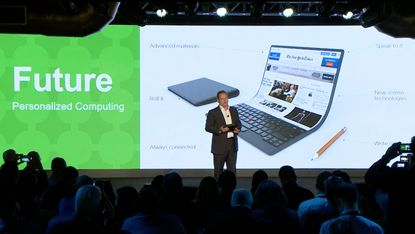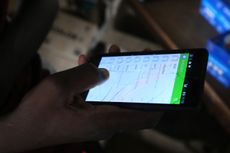Lenovo unveils its flexible laptop concept
'Advanced materials and new screen technologies' usher in a new way of interacting with your portable computer

Computer-makers are constantly experimenting with new ways to set themselves apart from the competition.
Some create laptops such as the Microsoft Surface Book, which feature detachable screens so users don't need to buy a separate tablet.
Others, latest generation of MacBook Pros, for example, come equipped with touchscreens to add further functionality to the keyboard.
Subscribe to The Week
Escape your echo chamber. Get the facts behind the news, plus analysis from multiple perspectives.

Sign up for The Week's Free Newsletters
From our morning news briefing to a weekly Good News Newsletter, get the best of The Week delivered directly to your inbox.
From our morning news briefing to a weekly Good News Newsletter, get the best of The Week delivered directly to your inbox.
However, Lenovo has revealed a laptop concept it hopes will revolutionise the way people interact with portable computers.
The currently-nameless computer is equipped with a radical bendable screen, which can be folded in half or laid out completely flat. It can also be drawn on.
"It's a new set of advanced materials and new screen technologies," says Christian Teismann, head of commercial at Lenovo.
The laptop "will be controlled by voice", together with the small red "pointing stick" that has appeared on Lenovo notebooks for over a decade, says Wired.
Little is known about the device, but Business Insider says the only flexible screen currently available uses OLED (organic light emitting diode) technology, suggesting the use of a similar technology here.
However, Lenovo has still equipped the computer with a conventional mouse and keyboard, suggesting the tried-and-tested layout will be "the best way to use computers in the foreseeable future", adds the site.
It's not the first Lenovo concept to adapt a flexible screen - the Chinese company revealed a smartphone with a bendable display during it's Tech World event last year.
According to Cnet, the mobile can either be used as a conventional smartphone or folded around the user's wrist, taking the form of a smartwatch.
It has yet to reach production, but the concept ran a version of the Android mobile operating system and was finished in one of 12 colours.
Much like the flexible smartphone, Lenovo says the bendable laptop is strictly a "concept" and there's no indication it will reach production within the near future.
Create an account with the same email registered to your subscription to unlock access.
Sign up for Today's Best Articles in your inbox
A free daily email with the biggest news stories of the day – and the best features from TheWeek.com
-
 DOJ settles with Nassar victims for $138M
DOJ settles with Nassar victims for $138MSpeed Read The settlement includes 139 sexual abuse victims of the former USA Gymnastics doctor
By Justin Klawans, The Week US Published
-
 14 recent scientific breakthroughs
14 recent scientific breakthroughsIn Depth From photos of the infant universe to an energy advancement that could save the planet
By Devika Rao, The Week US Published
-
 Who will win the 2024 presidential election?
Who will win the 2024 presidential election?In Depth Election year is here. Who are pollsters and experts predicting to win the White House?
By Justin Klawans, The Week US Published
-
 The best student laptops
The best student laptopsThe Week Recommends Stylish and versatile laptops to use for academic work or gaming
By The Week Staff Last updated
-
 Why Easter weekend is ‘riskiest time’ for phones and laptops
Why Easter weekend is ‘riskiest time’ for phones and laptopsSpeed Read Device repair demand is highest at start of April, with people in Norwich suffering the most faults
By Harriet Marsden Published
-
 Sport on TV guide: Christmas 2022 and New Year listings
Sport on TV guide: Christmas 2022 and New Year listingsSpeed Read Enjoy a feast of sporting action with football, darts, rugby union, racing, NFL and NBA
By Mike Starling Published
-
 House of the Dragon: what to expect from the Game of Thrones prequel
House of the Dragon: what to expect from the Game of Thrones prequelSpeed Read Ten-part series, set 200 years before GoT, will show the incestuous decline of Targaryen
By Chas Newkey-Burden Published
-
 One in 20 young Americans identify as trans or non-binary
One in 20 young Americans identify as trans or non-binarySpeed Read New research suggests that 44% of US adults know someone who is transgender
By The Week Staff Published
-
 The Turner Prize 2022: a ‘vintage’ shortlist?
The Turner Prize 2022: a ‘vintage’ shortlist?Speed Read All four artists look towards ‘growth, revival and reinvention’ in their work
By The Week Staff Last updated
-
 What’s on TV this Christmas? The best holiday television
What’s on TV this Christmas? The best holiday televisionSpeed Read From films and documentaries to musicals for all the family
By The Week Staff Published
-
 Coco vision: up close to Chanel opticals
Coco vision: up close to Chanel opticalsSpeed Read Parisian luxury house adds opticals to digital offering
By The Week Staff Published